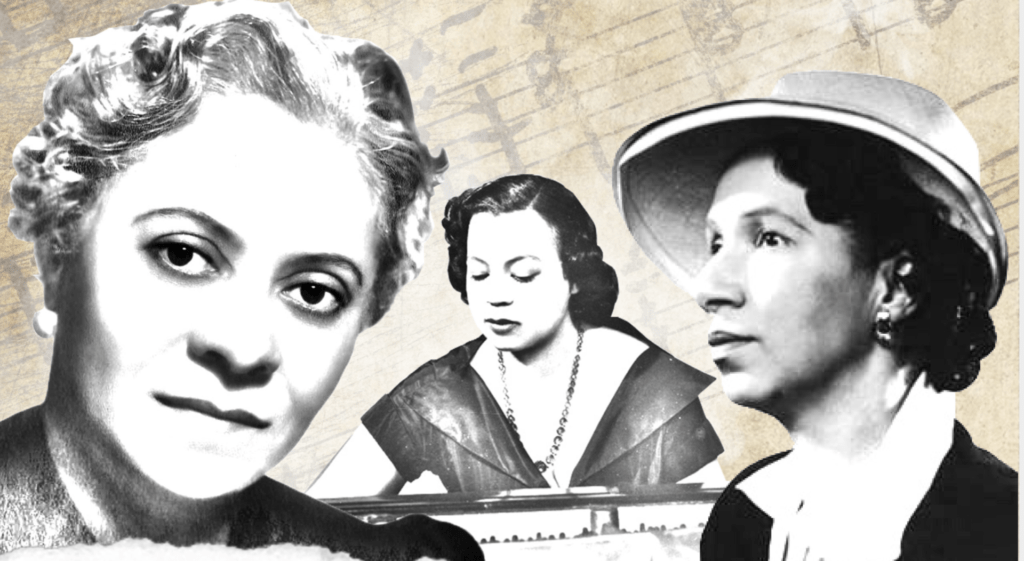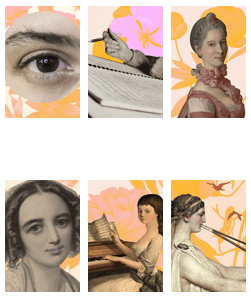Celebrating Women Composers: Unveiling the Oft Forgotten Treasures of Black Music History
ARTICLE | 27, OCTOBER 2023

Black History Month serves as a poignant reminder to honour the incredible contributions of African Americans throughout history. While we often acknowledge prominent figures like Martin Luther King Jr., Maya Angelou, and Frederick Douglass, it is equally important to shine a light on the lesser-known heroes and heroines who have enriched our cultural tapestry. In this article, we embark on a journey to discover the remarkable women composers who have made indelible marks on the world of music, yet whose stories and achievements often remain hidden, or underperformed on the concert stage.
The history of black women composers is a testament to resilience, creativity, and the enduring power of art to transcend adversity. Despite facing systemic racism, gender bias, and limited opportunities, these women have defied the odds to create music that has touched the hearts and souls of countless individuals.
A whistle stop tour of some amazing black female composers you should know…








Florence Price (1887-1953)
Born in Little Rock, Arkansas, Price became the first African American woman to have her composition performed by a major American orchestra when the Chicago Symphony Orchestra played her Symphony in E Minor in 1933. Her works are characterised by lush melodies, rich harmonies, and a deep connection to her Southern roots.
Julia Perry (1924-1979)
Julia Perry, a composer with a diverse body of work, was known for her symphonies, chamber music, and vocal compositions. Perry’s music often explored themes of identity and culture, reflecting her experiences as a black woman. Her composition “Stabat Mater” stands as a poignant example of her ability to evoke powerful emotions through music.
Tania León (Born 1943)
Tania León is a living legend in contemporary classical music. A Cuban-born composer, conductor, and educator, León’s music seamlessly blends elements of Afro-Cuban heritage with Western classical traditions. Her works, like “A la Par,” showcase her innovative spirit and commitment to pushing artistic boundaries.
Eva Jessye (1895-1992)
Eva Jessye was an accomplished composer, conductor, and choral director. She is best known for her work as the choral director for George Gershwin’s groundbreaking opera, “Porgy and Bess.” Her expertise in choral music and her collaboration with Gershwin played a crucial role in shaping the opera’s success.
Betty Jackson King (1928-1994)
Betty Jackson King was a prolific composer and conductor known for her contributions to choral music. She composed numerous works for choirs and received commissions from various organisations. King’s compositions often drew inspiration from African American spirituals and hymns.
Undine Smith Moore (1904-1989)
Undine Smith Moore, a highly regarded composer, educator, and ethnomusicologist, made significant contributions to choral music. Her compositions, including “Mother to Son” and “Daniel, Daniel, Servant of the Lord,” are celebrated for their spiritual depth and emotional resonance. Moore’s influence extended beyond her music, as she also dedicated her life to teaching and mentoring future generations of musicians.
Mary Lou Williams (1910-1981)
Mary Lou Williams was a trailblazer in the world of jazz. As a pianist, composer, and arranger, she played a pivotal role in the development of bebop and jazz education. Williams’ compositions, such as “Zodiac Suite” and “Mary Lou’s Mass,” showcase her versatility and innovative approach to blending jazz with spiritual and classical elements.
Margaret Bonds (1913-1972)
Margaret Bonds was a gifted pianist and composer who worked closely with Langston Hughes, setting many of his poems to music. Her compositions often reflected themes of racial and social justice. One of her most notable works is “The Ballad of the Brown King,” a Christmas cantata inspired by the life of Martin Luther King Jr.
Zenobia Powell Perry (1908-2004)
Zenobia Powell Perry was a composer and educator whose music encompassed a wide range of styles, from classical to jazz and spirituals. Her compositions, which include symphonies, chamber music, and vocal works, are celebrated for their versatility and emotional depth.
Preserving and Celebrating Their Legacy
While these women composers have left an indelible mark on the world of music, their contributions have not always received the recognition they deserve. It is incumbent upon us to honour their legacy by actively seeking out their music, sharing their stories, and supporting initiatives that promote diversity and inclusion in the arts.
In schools and universities, it is crucial to include their works in curricula and highlight the rich history of black women in music. Concert halls and performing arts organisations can contribute by featuring their compositions in their programs, fostering a deeper appreciation for their music among audiences.

Elizabeth Hardman is Soprano & PhD Researcher
Music PhD | OOC-DTP Studentship | “Confronting canonicity and promoting diversity: Gender and contemporary concert programming”
Faculty of Arts and Social Sciences
You can find her on Twitter & Instagram @Lizzyhardmansop or on her website.

Help to amplify more women in music by sharing
this post today.
HAVE YOU VISITED OUR SHOP?
All the revenue from sales will go to support many initiatives that advance diversity, create opportunities, and have a direct impact in the future of women in music.









